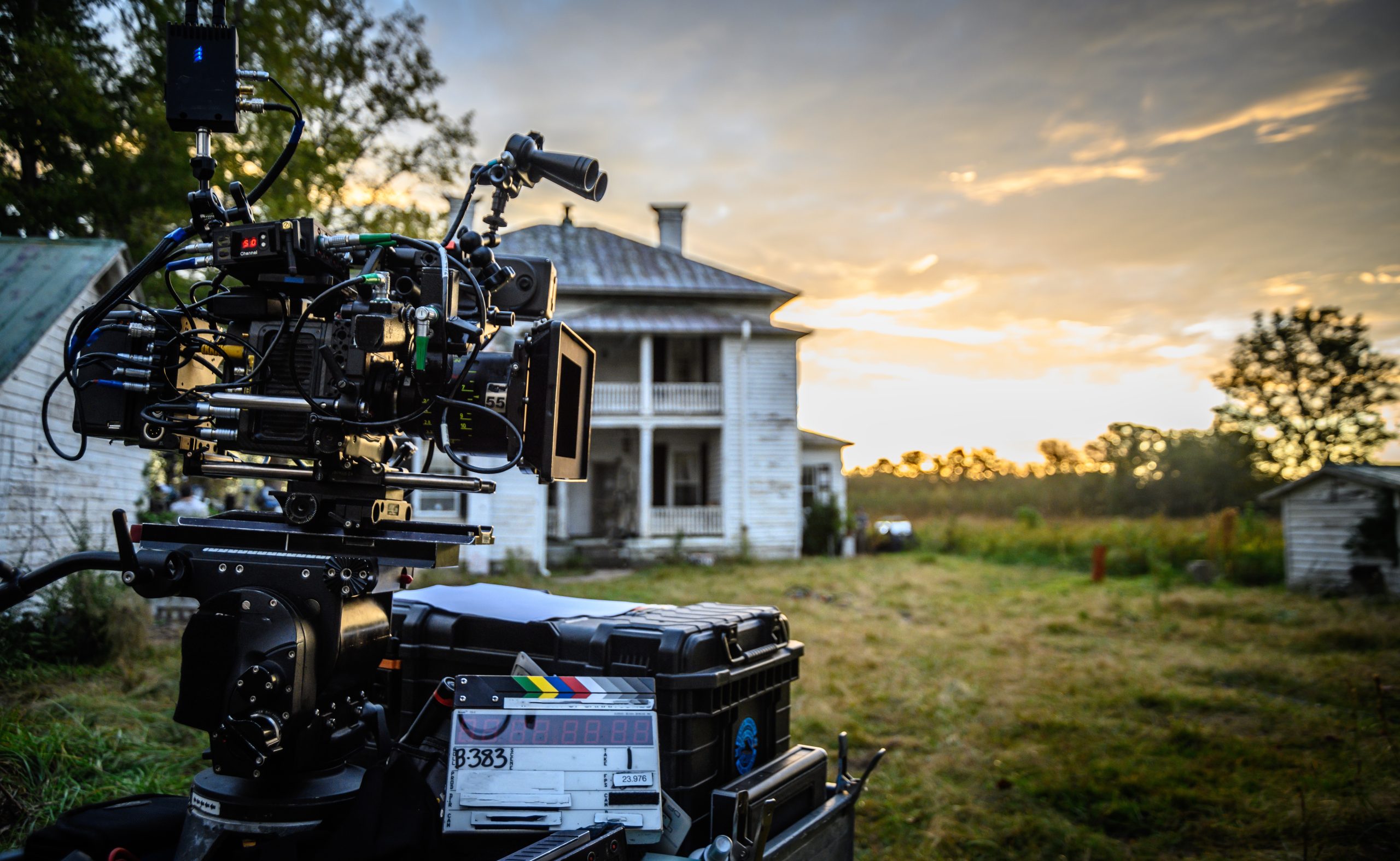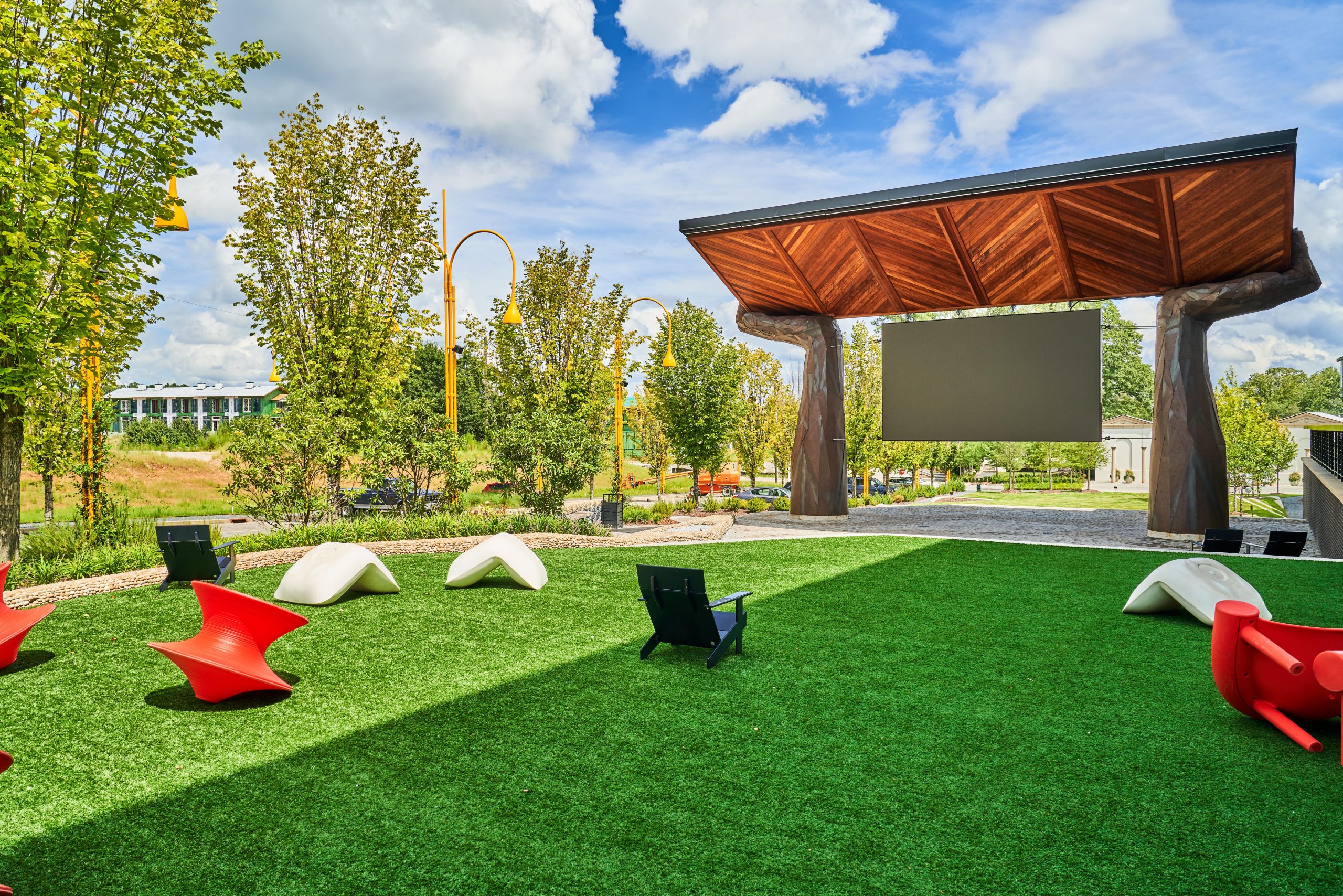Image courtesy of Gorodenkoff via Adobe Stock
By
Welcome to Fayetteville, Georgia (population 19,000). This small Georgia city isn’t a household name — at least not yet. At first glance, the quiet suburb, about 20 miles south of Downtown Atlanta, wouldn’t strike a visitor as especially noteworthy. While it’s grown exponentially over the last decade, it still maintains a semi-rural, small-town feel. But there’s something about it that makes it one of the most unique towns in the country.
Fayetteville is home to Trilith Studios. Trilith was the second-largest movie studio in the United States as of last year, but with expansion plans in the works, it will soon be the largest movie studio in the world. Since opening in 2015, many well-known movies and shows have been filmed there.
Most notably, Marvel began filming all its movies at Trilith since the studio opened. Marvel movies such as Ant-Man, Guardians of the Galaxy, Black Adam, and Spider-Man: Homecoming were filmed at Trilith. The studio also hosts the game show Family Feud and served as the filming location for other prominent Hollywood movie productions such as Passengers and Zombieland: Double Tap.
Fayetteville hit the big screen by bringing in a big-time movie studio, but how did they attract Trilith in the first place?

Image courtesy of Darwin Brandis via Adobe Stock
Georgia has generous tax incentives for the film industry, with most large film projects receiving a 30 percent tax credit for all expenditures when filming in the state. Other states have followed suit, but Georgia stands out from the pack because they have the existing, extensive infrastructure of studios, equipment, and local talent that production companies need to succeed. Georgia has 3 million square feet of movie studio space, ranking just ahead of NYC and second only to the Los Angeles area.
The state tax incentives and existing film infrastructure in Georgia explain why Trilith, initially known as Pinewood Studios, opened up in the Atlanta area. Why they chose Fayetteville is a different question.
“I don’t want to say [Trilith Studios] just fell into our lap, but it did come quicker than we had anticipated,” said Joe Clark, a Fayetteville Council Member who was the Planning and Zoning Commissioner in 2015 when the studio officially opened.
Fayetteville had an abundance of available land at an affordable rate, which appeals to large movie studios with sprawling campuses. Trilith also planned on completing expansion projects and constructing a large residential neighborhood and entertainment complex nearby, so the availability of cheap land less than 30 minutes from the airport was crucial.
But Clark said that Trilith ultimately chose Fayetteville because they saw the city as a great partner. He admits that Fayetteville was very fortunate and even lucky to land the giant project but credits local leadership, especially Mayor Ed Johnson, for embracing Trillith with open arms. Ed Johnson was a city council member in 2013 when the Trilith deal passed and was elected mayor in 2015, the same year that movies began filming at the studio complex.
“[Mayor Ed Johnson] is very visionary on a lot of things. He actually compiled a city council of people to run who looked to the future. There are small suburban cities that sometimes don’t want to change. Well, you either change, or you die. It’s one or the other. There’s usually not much in between other than mediocrity”, Clark said.

Image courtesy of Kenyatta Russell via Adobe Stock
The Fayetteville city council unanimously approved Trilith’s annexation request of about 1,200 acres in 2013. Following the annexation, Fayette County passed generous tax breaks to incentivize Trillith to move to Fayetteville and continue to invest in the city. Trilith received a ten-year tax abatement from the county beginning with its opening in 2015, increasing 10 percent annually. In 2023, the abatement is in its 8th year at 80 percent, meaning Trilith pays 80 percent of its county and city taxes. Trilith’s tax responsibility will move up to 100 percent in two years.
Trilith’s land will raise about $4 million in yearly tax revenue for the city and county once the expansion plans are complete. Before the studio opened, that plot of land raised a measly $19,000 annually for the city and county.
Over the last ten years, Trilith went all-in on the city of Fayetteville with continued expansion and investment. The studio currently has 24 premium sound stages for filming, more than one million square feet of production facilities, costume shops, and construction workshops, along with a 400-acre backlot.
Trilith is currently adding eight more soundstages to increase the total to 32. Future expansion, to be completed in 2032, will include an additional 4.7 million square feet of film production, warehouse, office, and retail space, along with 55 residential units. By the time expansion is completed, Trilith will be the world’s largest movie and production studio. Clark told Community Playmaker that there are over 6,000 jobs that are directly related to Trilith in construction and production, and that doesn’t include other non-studio projects that Trilith supports.
Additionally, Trilith recently constructed a large neighborhood just across the street from the studio called Town at Trillith. Designed to look like a European village, Town at Trilith has 1,400 modern homes and retail space for shops and restaurants. The neighborhood has won numerous awards since 2020, recently winning three in 2023 from the National Association of Home Builders for its high-quality innovation and design. People from all over the country and the world have moved to Fayetteville and Town at Trillith.
“You would think that all of [the new residents] would be from the movie industry. Well, they’re not. Many are people who are simply moving there for the lifestyle”, Clark said.
A large, new entertainment complex called Trillith Live will sit adjacent to Town at Trillith. Expected to open in 2025, it will include two live audience television stages, a luxury movie theater, and a 1,800-seat auditorium that can host theater productions, concerts, and more. There will also be a large outdoor plaza, 120,000 square feet of office space, a food court, and retail shops.
The city didn’t have to pay anything for the world-class auditorium that will be part of the Trilith Live project. Trilith will cover the construction and operating costs of the future 1,800-seat City of Fayetteville Cultural and Performing Arts Center. In exchange, the city government granted Trilith a 501(c)(3) tax exemption that is specific to the operation of the performing arts center. According to Clark, the theater will “compete with anything on Broadway.”

Image courtesy of Kenyatta Russell via Adobe Stock
Trilith’s impact goes beyond the large studio, adjacent neighborhood, and upcoming entertainment complex. Other companies want in on the action as well. A new QTS data center is coming to Fayetteville. It will support 150 high-paying jobs and roughly 7 million square feet of data storage facilities, making it the world’s largest data processing facility at full buildout. The project will have a massive impact. Clark said that the project will generate $58 million a year in tax revenue, with $49 million going to the county and $9 million to the city of Fayetteville. That’s almost a quarter of Fayetteville’s annual budget.
Additionally, the data center will bring in several hundred technicians every week who will patronize the city’s hotels and growing small businesses community. In fact, 20 or 30 new small businesses, such as restaurants and boutique shops, are opening every month in the city due to the recent explosion of new residents and visitors flocking to the area.
Tourism is also increasing. There is a shortage of hotel rooms, and while a new hotel is opening near the Town at Trilith, the city is struggling to build hotel rooms fast enough to keep up with the skyrocketing demand. Clark said there is also so much demand from visitors for car rentals that the rental car excise tax alone funds their entire Main Street program.
“It’s just crazy. We never thought we, as a city would be [this successful]. But we’re going to continue to work with Trilith to continue to create a good lifestyle for everybody. Without Trilith, the catalyst [for recent growth] wouldn’t be there.”
When asked what makes Fayetteville a business-friendly city, Clark said that Tesla originally planned to open a large new customer care center in nearby Peachtree City but decided on Fayetteville instead after meeting city leaders.
“Tesla planned to go to Peachtree City until they came through Fayetteville. They told us that our city government was so much easier to work with. Because we understand that…you have got to be a willing partner. You can’t say no all the time…you’ve got to say yes to the right projects, [including] the ones that some people might not understand at the beginning.”
Trilith Studios brought and continues to bring massive economic expansion and development to Fayetteville. With the upcoming expansion of Trilith Studios, the opening of Trilith Live, and additional development, Fayetteville will be home to the largest movie studio in the world, the world’s most extensive data processing facility, and will become an increasingly international city with world-class entertainment and performing arts facilities.
According to Clark, a former resident of Downtown Atlanta, Fayetteville was “basically the middle of nowhere” not that long ago. “Ten years ago, Fayetteville was a bedroom community to commute to the area around the airport. Either that or you were born here”, Clark said.
Now, it’s a thriving city that attracts visitors and new residents from around the globe. While other nearby towns stay the same, Fayetteville embraced change with open arms and continues to reap the rewards.
“I am excited about everything that’s happening [in Fayetteville]. I plan on living here the rest of my life”, Clark said.
Magazine
Playmaker Events
Connect with playmaker